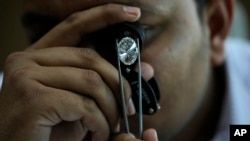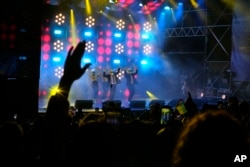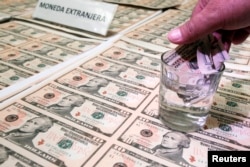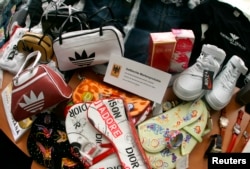And now, Words and Their Stories, from VOA Learning English.
You can trust that we are actually Voice of America Learning English. We are the real deal. We are authentic.
In other words, we are not bogus.
Bogus is an adjective that means fake or phony. Something bogus is not genuine. It is a fraud. It’s fraudulent.
For example, the man’s huge diamond ring was bogus. He told everyone it was a real diamond. But actually, it was just a piece of glass.
Bogus can describe something that is a lie.
If something like an explanation or reason is bogus, it’s not true. For example, an employee might call her employer to say she needs a sick day off from work. But during the call, her boss hears loud, live music in the background. The employee was clearly at a music show. Her reason for not being at work was bogus.
We could also say the employee’s excuse did not hold water. Her excuse for missing work sounded bogus. It was not believable. It didn’t hold water.
Experts at the online dictionary Merriam-Webster explain that bogus began as a noun. In the early 19th century in the U.S., a bogus was a machine that made counterfeit, or fake, money.
Here’s a fun fact: You can call bogus, counterfeit money funny money.
Here is another word related to bogus – sham. Sham, a noun, describes a fake, made-up situation. We use shams to cover up the truth.
Let’s hear some of these terms used in a short story.
Two roommates work together at a bank. One day, they decide to steal all the gold and jewelry held in the bank’s safe. So, they plot. They plan it out. First, they need an alibi. Where can they be while the robbery is actually happening? They create a bogus alibi. They tell police that at the time of the robbery, they were together at a volunteer event, cleaning up a local park by the town’s river.
But after checking out their alibi, police brought the two in for questioning. Then detectives searched their shared apartment and found all the gold and jewels from the bank robbery.
What made the police suspect them? Can you guess what detectives found at the river park that proved their alibi was a sham? A dirty park and river! They both had a huge amount of trash! Clearly, no clean-up event had ever taken place.
And that’s all the time we have for this Words and Their Stories. Until next time … I’m Anna Matteo.
Anna Matteo wrote this lesson for VOA Learning English.
______________________________________
Words in This Story
authentic – adj. not false or imitation : real, actual
bogus – adj. not genuine
phony – adj. not genuine or real : intended to deceive or mislead
genuine – adj. not pretended : sincere, honest
fraud – n. an act of deceiving or misrepresenting : trick
did not hold water – idiom : to not be or not appear to be true, verifiable, or able to be supported by facts
counterfeit – adj. made in imitation of something else with intent to deceive
We want to hear from you. Do you have a similar expression in your language? In the Comments section, you can also practice using any of the expressions from the story. Our comment policy is here.









Forum